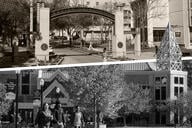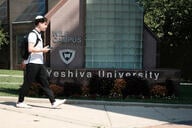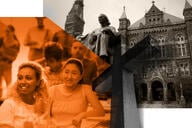You have /5 articles left.
Sign up for a free account or log in.

LeoPatrizi/E+/Getty Images
The Graduate Theological Union, a consortium for the graduate-level study of religion, launched a new online learning platform this week focused on the intersection of spirituality and activism.
The new online hub, called GTUx, features lectures and learning modules by Graduate Theological Union faculty members, alumni and students. Scholars explore subjects ranging from ecospirituality to the intersection of spirituality and art to religious influences on the riot at the U.S. Capitol last year. GTUx will also include virtual art exhibits on religious or social justice themes, live discussions over Zoom, and other opportunities for users to connect with each other, including a Slack channel and a Facebook group for dialogue. Participants are encouraged to donate an amount of their choice to support the project, but anyone can join and access the content for free.
The union, based in Berkeley, Calif., is made up of a collective of institutions and programs representing a variety of faith traditions and focuses on interreligious and interdisciplinary graduate education. The idea for GTUx was born out of a theory among consortium administrators that there’s demand for educational content about spirituality among people interested in social activism and community organizing, in and outside academia, regardless of whether they see themselves as affiliated with a religious tradition.
“Our sense is the world is hungry for a place to go to have rich conversations and do some deep-dive learning in a way that equips people to face the challenges that we are facing in the world right now, from climate change to racial injustice, religion and politics, and to have a place where people can gather,” said Jennifer W. Davidson, incoming dean and vice president for academic affairs and a professor of theology and worship at the Graduate Theological Union.
The platform is an opportunity to engage with these issues “with a sense of hope and a way of drawing on these really deep resources that we have in our wisdom and religious traditions,” she added.
A 2015 report by the Pew Research Center found that the percentage of Americans who identify as unaffiliated with a religion has rapidly grown, making up 23 percent of the population at that time, up from 16 percent in 2007. This growing detachment from religion is especially notable among younger Americans; 35 percent of millennials report having no religious affiliation. Yet many Americans show interest in spirituality, according to a study by the Fetzer Institute, a private foundation focused on fostering and studying spirituality in the United States. The study included a 2020 survey of 3,609 adults, conducted by NORC at the University of Chicago, a nonpartisan research organization, which found that 86 percent of respondents identified as spiritual to some degree, and more than 66 percent described their spirituality as guiding their behavior. Respondents who described themselves as moderately or very spiritual also reported engaging in volunteer work and civic action at higher rates.
J. Cody Nielsen, director of the Center for Spirituality and Social Justice at Dickinson College, said there’s a “growing rejection of formal religious practice” in the United States.
“More and more individuals in American society are looking at the religious structures in which they grew up in or which have dominated our national landscape … and they are rejecting those,” Nielsen said. “Yet people are deeply tied to understandings about a sort of greater sense of purpose, and people’s spirituality is mostly just changing.”
He noted that Americans are increasingly drawn to humanism or multiple religious traditions at once, rather than a single belief system, and they are “coming back to deep questions of philosophy.” So, the Graduate Theological Union is “on point” in creating programming focused on spirituality.
Leaders of the consortium say people are especially drawn to discussing spirituality and social justice during a pandemic that left many feeling isolated and amid the national reckoning with racism that followed the murder of George Floyd.
“The intersectional crises of public health, widespread injustice, political strife and heartbreaking violence that we have weathered as a global community make it clear that the need for this type of resource is more urgent than ever,” Uriah Kim, president of the Graduate Theological Union, said in a press release. “There is a deep desire for change, and we are proud to have created a space that allows learners and changemakers around the world to come together in knowledge, dialogue, and action.”
Frank Yamada, executive director of the Association of Theological Schools, a membership organization for graduate schools that educate faith leaders, said theological schools are increasingly devising new ways to “serve nontraditional students by nontraditional means,” a trend he said was accelerated by the pandemic.
“This innovation that GTU is promoting is … seeking to reach digitally an audience with their educational mission that might not be traditional, degree-seeking students,” he said.
He believes theological school leaders are motivated by enrollment challenges. Overall enrollment at Association of Theological Schools member institutions has held steady over 30 years—and the Graduate Theological Union has seen enrollment gains in the last several years. But mainline Protestant institutions “have seen pretty precipitous declines in enrollment over the last 15 to 20 years,” he said. These challenges have led to administrators “getting creative.”
Kim, the GTU president, noted in an email that people want more opportunities to pursue a religion education “side by side with their existing vocation” and that this is reflected in a “meaningful increase” in the number of part-time students and certificate-program students at the Graduate Theological Union.
Paul Brandeis Raushenbush, senior adviser for public affairs and innovation at Interfaith Youth Core, an organization focused on fostering interfaith cooperation and dialogue, said the consortium’s online platform can open up greater access to education about religion.
It’s an exciting and “long-overdue” development “for serious theological education to reach out beyond the confines of their walls and into the wider world,” he said.
While Raushenbush believes religion remains a powerful force in people’s lives and activism, he noted that the platform could provide “a different entry point” for those who may not think of religious traditions as having something to offer them.
“If you think of yourself as not religious or spiritual particularly, but you’re very interested in ecology or you’re very interested in racial justice, then you might … then go, ‘Oh, I didn’t even know that there was something there for me,’” he said. “They might enter the same portal through a different lane.”
He also hopes GTUx will give people a chance to engage with faith traditions other than their own because of the religious diversity of the consortium, which includes institutions and centers focused on Christianity, Judaism, Buddhism, Islam and Hinduism.
“I think the goal here is to place these different valuable wisdom traditions on the same page and almost in conversation with one another and let the world see that that’s possible,” Raushenbush said. “You might go there thinking, ‘You know what, I’m looking for something about Christian ecospirituality’ and then see something about Jewish ecospirituality and be like, ‘I didn’t even know that was a thing’ … That’s where the magic happens with education and especially with something as powerful as spirituality and religion.”
Nielsen said engaging a full variety of faith traditions is critical to “foster a more holistic educational experience” on the platform. He also believes the academic study of faith and activism needs to include difficult discussions about “the historic ways in which religion has been both helpful and harmful” to social movements and marginalized groups, which involves being “interrogators of our own histories and experiences.”
Davidson, the incoming dean of the Graduate Theological Union, said the consortium is home to many students, faculty members and administrators that are already having multifaith and academically rigorous discussions about social action and conducting relevant research.
“I think many of them would identify as people who are deeply spiritual … and who are also deeply committed to social justice,” she said. “This is an organic project for us that is trying to share who we are with the world in order to be a resource to others.”





